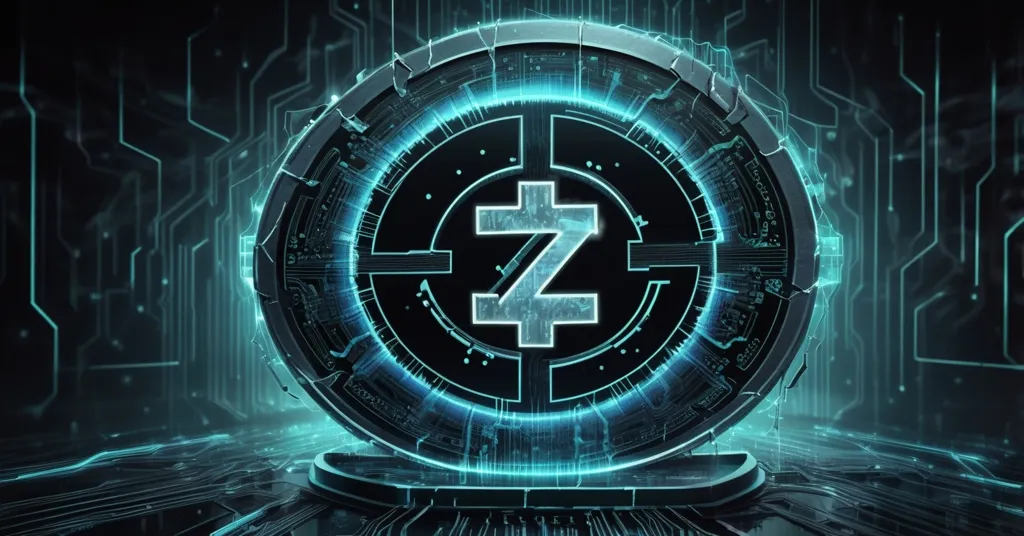Zcash Faces Quantum Threat: Can Its Privacy Survive the Coming Storm?

Zcash Quantum Resistance: Can It Survive the Coming Threat?
Quantum computing is no longer a distant dream—it’s a looming reality that could shatter the cryptographic walls protecting blockchain privacy. Zcash (ZEC), a flagship privacy coin, sits at the center of a fiery debate: can it withstand the quantum storm, or will its historical transactions be laid bare by future tech? Experts are split, and the stakes couldn’t be higher for users banking on anonymity in a decentralized world.
- Quantum Danger: Quantum computers may break elliptic-curve cryptography (ECC) within 5-10 years, risking retroactive decryption of privacy coin data.
- Zcash’s Shield: Its unique shielded pools aim to hide critical transaction details, potentially offering a quantum edge—if users play it safe.
- Hard Reality: Critics highlight metadata leaks, user errors, and ECC reliance as gaping holes in Zcash’s quantum armor.
Quantum Computing 101: The Tech That Could Break Crypto
Let’s get the basics down. Quantum computing harnesses the weirdness of quantum mechanics—think superposition and entanglement—to solve problems at speeds classical computers can’t touch. Unlike traditional machines that process bits as 0s or 1s, quantum computers use qubits, which can represent both states simultaneously, unleashing insane computational power. For cryptocurrencies, this power is a double-edged sword. Most blockchains, including Bitcoin and Zcash, rely on elliptic-curve cryptography (ECC), a math-based system to secure transactions and prove ownership. ECC is rock-solid against today’s computers, but quantum algorithms like Shor’s could crack it wide open, potentially within 5 to 10 years by some estimates. Tech giants like IBM and Google are pushing quantum boundaries—IBM hit 127 qubits in 2021, and governments like China are dumping billions into research. While timelines vary (some experts say 15 years, others sooner), the consensus is clear: quantum isn’t sci-fi anymore. It’s a ticking clock.
Privacy coins like Zcash, designed to obscure sender, receiver, and transaction amounts, face the sharpest threat. Why? Blockchains store data publicly and forever. Once quantum tech matures, historical transactions—even those shielded by today’s best crypto—could be decrypted, stripping away anonymity. This isn’t just a tech problem; it’s a privacy catastrophe waiting to happen. For deeper insights into whether Zcash is quantum-resistant, expert opinions shed light on the challenges ahead.
The ‘Harvest Now, Decrypt Later’ Nightmare
Nic Carter, co-founder of Coin Metrics and partner at Castle Island Ventures, has been sounding the alarm with a brutal reality check. He warns that adversaries—think state actors or rogue hackers—don’t need quantum computers today to screw over privacy coin users tomorrow. They can simply scrape blockchain data right now, stash it away, and wait for the tech to catch up. Carter calls this the “harvest now, decrypt later” strategy, and it’s a gut punch for blockchains.
“Blockchains are uniquely bad for quantum because normally the quantum thing is ‘harvest now decrypt later’ so adversaries have to be preemptively harvesting traffic but blockchains just.. publish.. everything.. forever,” Carter posted on October 30, 2025.
Picture this: someone records your encrypted Zcash transfer today, sits on it like a dragon hoarding gold, and in a few years, uses a quantum rig to unlock every detail. Unlike encrypted web traffic that might disappear if not captured in real-time, blockchain data is an open buffet—permanently accessible. Carter doubles down, predicting ECC’s downfall within roughly five years, meaning historical privacy coin transactions could be an open book by 2030.
“For privacy coins, even if they migrate to post-quantum cryptographic schemes, all historical transactions prior to that migration can be decrypted… So all historical txns will be stripped of privacy in >~5y. Everything is built on ECC,” Carter added.
With ZEC trading at $366 during this debate, the financial and personal stakes for users aren’t just theoretical—they’re painfully real. Lose privacy, and you lose the entire point of a coin like Zcash.
Zcash’s Shielded Defense: A Quantum Edge?
Before we write Zcash off as quantum roadkill, let’s hear from its defenders. Zcash, launched in 2016, stands out among privacy coins due to its shielded pools—think of them as black boxes labeled Sprout, Sapling, and Orchard. Unlike Bitcoin’s transparent ledger where anyone can see transaction details, shielded pools use zero-knowledge proofs to hide who sent what to whom. Zero-knowledge proofs are like proving you know a secret password without ever saying it out loud—a cryptographic sleight of hand that ensures privacy without spilling the beans. Zcash engineer Sean Bowe argues this design offers a unique shield against quantum snooping, even centuries down the line.
“There is no quantum computer or powerful AI that will be able to look back at the Zcash blockchain 1000 years from now and figure out who made every fully shielded transaction… That information, among other things, never even touches the ledger. It’s already gone,” Bowe asserted in July 2025.
Mert Mumtaz, CEO of Helius, backs this up, noting that while Carter’s warnings apply to privacy coins like Monero, Zcash’s architecture might dodge the quantum bullet—provided users nail their operational security (opsec). For the uninitiated, opsec means the habits and tools you use to stay anonymous, like not reusing wallet addresses or guarding against metadata leaks (data like your IP address that could tie you to a transaction). Mumtaz hints at upgrades in the pipeline, saying, “some things are in the works to make this even stronger.” If true, Zcash could be paving the way for a quantum-resistant future.
Zcash vs. Monero: Different Beasts, Same Threat?
Not all privacy coins are cut from the same cloth, and it’s worth comparing Zcash to Monero, another heavyweight in the anonymity game. Here’s a quick breakdown:
- Zcash: Uses zero-knowledge proofs in shielded pools to hide transaction details. Not all transactions are shielded by default (users can opt for transparent ones), but fully shielded data theoretically never hits the public ledger.
- Monero: Relies on ring signatures and stealth addresses to obscure transaction details. Every transaction is private by default, but some argue its data on the blockchain could be more vulnerable to quantum decryption compared to Zcash’s off-ledger approach.
Both face quantum risks due to ECC reliance, but Zcash supporters claim its design offers a stronger starting point. Still, without airtight opsec, even Zcash’s edge could crumble—more on that next.
The Skeptics Strike Back: Why Zcash Isn’t Bulletproof
Before we crown Zcash the quantum-proof champ, let’s face the harsh counterargument—and it’s a damn heavy one. Carter isn’t buying the hype, arguing that Zcash’s privacy rests on shaky ground: unrealistic expectations of perfect user behavior, zero metadata leaks, and no exchange key compromises. Let’s be brutally honest—humans suck at perfection. Users routinely screw up opsec by sending shielded ZEC to exchanges that demand Know-Your-Customer (KYC) data, linking their identity to transactions. Metadata leaks, like IP addresses exposed via poor network setups, are another Achilles’ heel. Real-world cases, like the 2018 tracing of Monero transactions through IP leaks, show how often privacy fails outside the lab. And with ECC still underpinning key exchange and proof verification in Zcash, quantum computers could exploit those cracks, shielded pools or not.
Carter, who clarifies he holds no ZEC to dodge bias claims, drives the point home: theoretical elegance means jack when sloppy humans and historical data are in play. Even if Zcash flips to post-quantum cryptography overnight—a logistical nightmare—every pre-switch transaction remains a sitting duck. Want better opsec? Start with a VPN and never tie shielded funds to KYC’d exchanges. But let’s not pretend most users will bother.
The Road to Quantum-Proofing: What’s Next for Zcash?
So, is Zcash doomed, or can it adapt? The crypto community isn’t sitting idle. Post-quantum cryptography—think lattice-based or hash-based algorithms—is being explored as a replacement for ECC across blockchains. These systems are designed to resist quantum attacks, though they’re often clunkier and less efficient, posing integration challenges. For Zcash, adopting such schemes would be a herculean task involving consensus changes, wallet updates, and ensuring backward compatibility. Historical data would still be at risk unless retroactive shielding tricks are invented (unlikely). While specifics on Zcash’s roadmap are murky, community forums buzz with talk of quantum-resistant upgrades, and Mumtaz’s tease of “things in the works” suggests movement behind the scenes.
But timeline is everything. If quantum breakthroughs hit before these defenses are deployed, privacy could take a fatal hit. And let’s not ignore the market angle: with ZEC at $366, quantum fears could spook investors, denting adoption by privacy-hungry users. Compare that to Bitcoin, where transparency sidesteps quantum privacy risks entirely—though at the cost of anonymity. It’s a trade-off that keeps BTC maximalists smirking, but for those of us championing financial freedom, privacy coins like Zcash fill a niche BTC can’t touch, especially in oppressive regimes where anonymity is survival.
Playing Devil’s Advocate: Should We Ditch Privacy Coins?
Here’s a spicy thought: if Zcash and its ilk can’t guarantee long-term anonymity against quantum threats, why bother with them over Bitcoin? BTC’s open ledger dodges the privacy pitfall—nobody’s decrypting what’s already public. But hold on—dismissing privacy coins ignores their raw power. In a world of surveillance and control, Zcash offers a middle finger to centralized oversight, a tool for dissidents and anyone craving financial sovereignty. Quantum risks are real, but abandoning privacy tech surrenders a key front in the decentralization war. The answer isn’t to ditch Zcash; it’s to accelerate solutions, push for post-quantum fixes, and educate users on opsec. Effective accelerationism means doubling down, not backing off.
Key Questions on Zcash and Quantum Threats
- What’s the core quantum threat to privacy coins like Zcash?
Quantum computers could shatter ECC, the cryptographic foundation of most blockchains, within 5-10 years, allowing retroactive decryption of historical transaction data and killing user anonymity. - How does ‘harvest now, decrypt later’ undermine blockchain privacy?
Adversaries can collect publicly available blockchain data today and decrypt it later with quantum tech, exploiting the permanent, open nature of these ledgers for future snooping. - Is Zcash truly safe from quantum computers?
Its shielded pools hide key transaction data off-ledger, offering theoretical protection, but real-world issues like user errors, metadata leaks, and ECC reliance leave vulnerabilities. - How does Zcash compare to Monero against quantum risks?
Zcash’s design may shield more data from quantum decryption than Monero’s ring-signature approach, but both remain at risk without perfect opsec and post-quantum upgrades. - Why can’t Zcash just become quantum-proof now?
Shifting to post-quantum cryptography is slow, complex, and won’t protect historical data, while user behavior and external leaks keep posing risks even after upgrades. - Can investors trust Zcash in a quantum future?
Not fully—quantum fears could shake confidence and price (ZEC at $366 now), but ongoing research and Zcash’s unique design offer hope if solutions outpace threats.
The quantum clock is ticking, and privacy coins like Zcash are on the front lines of a battle for anonymity in a decentralized future. Its shielded pools are a bold stab at resistance, but as Carter’s warnings hammer home, no system is foolproof when human error and historical data are in the mix. For Bitcoin maximalists, this might cement BTC’s edge—transparency over risky privacy plays. Yet, for those of us rooting for disruption and freedom, Zcash’s fight matters. Quantum threats test the promise of a financial system beyond centralized control, and staying ahead means knowing the risks, tightening opsec, and pushing for innovation. This isn’t just a tech debate; it’s a fight for what crypto stands for.



